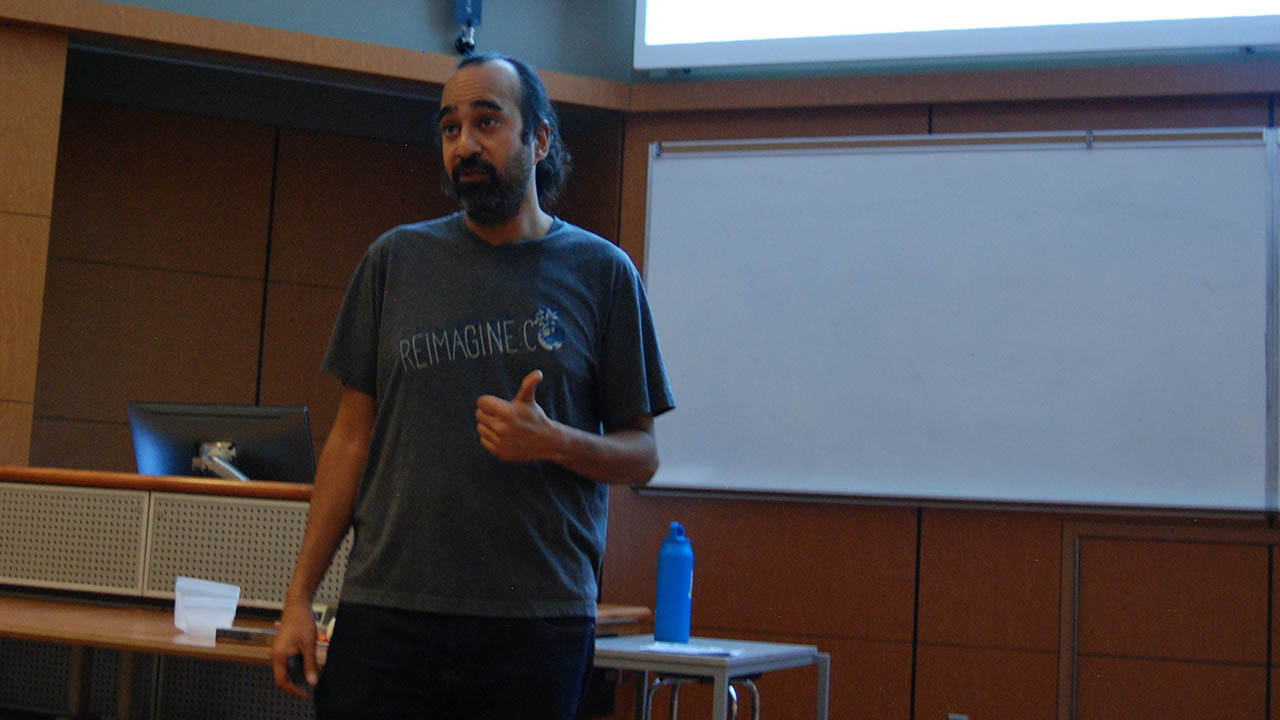Taking small steps to a zero-waste lifestyle
 CREDIT: EMILY STEWART
CREDIT: EMILY STEWARTHeenal Rajani, co-founder of Reimagine Co. listed the several small steps towards a zero-waste lifestyle during a workshop on Feb. 25.
Living a zero-waste lifestyle isn’t necessarily about no waste at all.
Reimagine Co. went to the Alumni Lecture Theatre at Fanshawe College on Feb. 25 to run a Zero- waste Workshop. Heenal Rajani, co-founder of Reimagine Co., explained what zero-waste means, his own zero-waste journey, and waste reduction strategies to the students, faculty, staff, and members of the greater London, Ont. community.
“For me, zero-waste doesn’t mean zero. People think about zero- waste as maybe people producing a mason jar for full of garbage in a year,” Rajani said. “Some of the people who popularize the zero- waste movement, you see their Instagrams or their blogs where they’re producing a Mason jar worth of garbage or they don’t buy anything in a whole year, this kind of thing. That’s not realistic or even possible for most people, the way that our society is structured.”
Zero-waste, rather, is raising awareness about consumption. Refusing, reusing, rotting (composting), and recycling are all steps to take towards a zero-waste lifestyle. Sending items into a landfill is the absolute last option.
Refusing what you don’t need in life is the top priority and includes declining free items at events and avoiding single-use plastics in favour of reusable items. Rajani said to pick one way to reduce waste and stick to it. For example, you can refuse single-use coffee cups and instead, only buy hot drinks when you have your reusable mug with you.
Simplifying and deciding what you need and don’t need is the next step. Rajani acknowledged it’s not always easy, but it can help prioritize what’s necessary.
“The less you have, the less you want is what I’ve found” he said.
Bringing your own reusable produce bags to grocers and containers to restaurants reduces single-use item consumption.
Composting can be done at home, either through a composter bought from a City of London EnviroDepot or through feeding food scraps to worms, otherwise known as vermiculture. If composting at home isn’t possible, freeze the scraps for a week or so and bring it to a place that composts and/or use the ShareWaste app to connect with people who compost.
Reducing consumption whenever possible also looks like cooking more at home and reducing packaged food purchases. Rajani said that while there’s a misconception that zero-waste shopping is expensive, he and his family saved money by refusing packaged food. Buying second-hand items like clothing and toys is also more eco-friendly, but if you are purchasing new items, buying higher-quality can reduce constant consumption and saving money in the long run.
Earlier in the presentation, Rajani mentioned that recycling, while well-regarded, isn’t the be-all-end all for sustainability. When recycling is the option, think about recycling well. The app Recycle Coach can be used as a guide to proper recycling.
Rajani acknowledged when it’s tough to make individual changes towards a zero-waste lifestyle, making it a fun game with friends builds motivation.
“If you’re interested in starting your zero-waste journey, find a friend to do it with and hold each other accountable. Challenge each other, see who can be better or however you want to do it.”
During the presentation, EnviroFanshawe President Rebecca Amendola said the club is running a Bring Your Own contest. Students can post a photo on Instagram or Facebook with hashtag #byofanshawe that shows how they brought their own reusable items to campus for a chance to win a reusable prize pack from Reimagine Co. An EnviroFanshawe Instagram post said students can enter once a day.
For more information about Reimagine Co.’s products, workshops, and events, visit reimagineco.ca.















